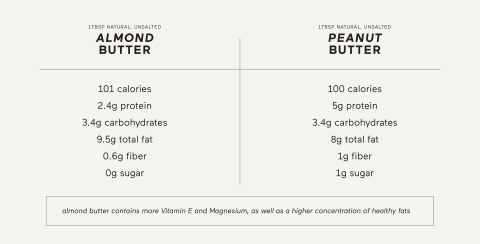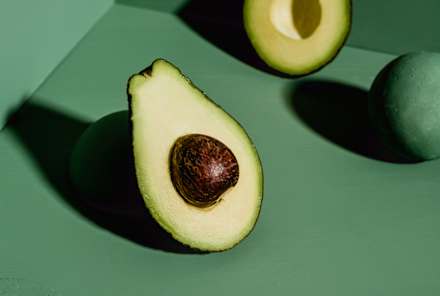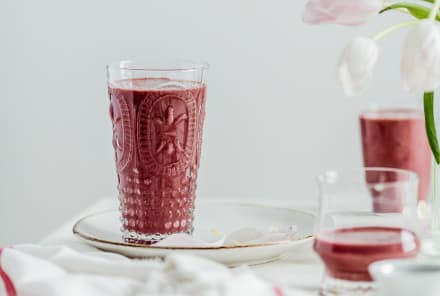Advertisement
Almond vs. Peanut Butter: Nutritionists Dig Into Which Is Healthier


Almond butter and peanut butter are two popular and nutrient-rich nut butter options. But is one healthier than the other? Here, we'll compare almond and peanut butter's nutritional profiles and their potential health benefits and drawbacks.
Whether you're a nut butter enthusiast or just starting to look for a healthy and tasty spread, this guide will help you decide which is best for you.
Almond butter
Almond butter is high in protein and contains healthy fats, fiber, vitamins, and minerals, making it a nutrient-dense nut butter.
Per the American Heart Association1, monounsaturated and polyunsaturated fats can reduce harmful cholesterol levels and lower heart disease risk. Almond butter is a good source of these fats, plus it also contains significant amounts of vitamin E2, magnesium, potassium, and iron—essential nutrients for maintaining healthy bodily functions.
Almond butter nutritional value
Here's what's in a one-tablespoon serving of almond butter3:
- Calories: 98
- Protein: 3.4 grams
- Fat: 8.9 grams
- Carbohydrates: 3 grams
- Fiber: 1.7 grams
- Sugar: 0.7 grams
“Almonds are a healthful food that I recommend to my clients all the time,” says Ginger Hultin, MS, RDN, CSO, a registered dietitian nutritionist and author of Anti-Inflammatory Diet Meal Prep, noting that they're high in protein, heart-healthy unsaturated fats, and fiber, and they also contain calcium, magnesium, iron, and vitamin E.
However, Manju Karkare, MS, RDN, a registered dietitian nutritionist, cautions that a “High intake of almonds or almond butter eventually increases total fat intake," so you'll want to watch serving sizes.
Almond butter health benefits
- It may have anti-inflammatory properties: Several studies have suggested that almonds and almond butter have anti-inflammatory properties, which may help reduce the risk of chronic diseases such as heart disease and cancer4. In addition, almond butter has been shown to lower inflammation markers4 in the body, which may be due to its high content of healthy fats, antioxidants, and fiber.
- It may help with weight loss: Almond butter may also be beneficial for weight loss. Despite its high calorie and fat content, a recent study suggests that incorporating almonds or almond butter into the diet can lead to weight loss and improved body composition2. In addition, the high protein and fiber content of almonds and almond butter can increase satiety5, which may lead to reduced calorie intake.
- It can be beneficial for those with diabetes: Almond butter can also be a good option for individuals with diabetes. Almonds have a low glycemic index and can help regulate blood sugar levels. They’re also rich in magnesium, which is vital for insulin sensitivity6.
Note: Almond butter contains phytic acid, which can bind to certain minerals and reduce their absorption7. This may be a concern for individuals with nutrient deficiencies. Those with tree nut allergies will also want to steer clear.
Almond butter taste and texture
Almond butter has a distinct nutty flavor, often described as creamy, rich, and slightly sweet.
In addition, it has a smooth and velvety texture that makes it an excellent spread on toast, crackers, or apple slices. Some people also use it as a dip for veggies, a topping for oatmeal, or a base for smoothies.
Almond butter is a versatile ingredient that can work in various recipes—from cookies to rice cakes to energy balls. Almond butter can also make sauces, dressings, and marinades. It adds a rich and nutty flavor to baked goods, making them more moist and tender.
And don't forget that almond butter can be used in savory dishes too, such as stir-fries, curries, and soups, to add depth and creaminess.
Almond butter cost and availability
The cost of almond butter varies depending on the brand, type, and quantity. But generally, almond butter is more expensive than peanut butter.
For example, a 16-ounce jar of almond butter can range from $7 to $15, and larger sizes or specialty flavors could be even more expensive. Almond butter is widely available in grocery stores, health food stores, and online retailers. It can be found in both natural and conventional versions.
When purchasing almond butter, it’s essential to read the label and check the ingredients to ensure it is made solely from almonds without added sugars, oils, or preservatives. Additionally, some brands may use roasted almonds or raw almonds in their almond butter, which can affect the taste and nutritional content.
Peanut butter
Peanut butter is a popular and nutritious spread made from ground peanuts. Like almond butter, it's an excellent source of protein, healthy fats, and various vitamins and minerals.
Additionally, peanuts and peanut butter are good sources of vitamin E8, magnesium, phosphorus, and potassium. These nutrients are essential for maintaining healthy skin, muscles, bones, and a robust immune system.
Peanut butter nutritional value
In a typical tablespoon of peanut butter9, you'll find:
- Calories: 95.5
- Protein: 3.6 grams
- Fat: 8.2 grams
- Carbohydrates: 3.5 grams
- Fiber: 0.8 grams
- Sugar: 1.7 grams
“Peanut butter is calorically dense (the same issue as almond butter), and I would add that you need to read the label of your nut butters to ensure there are no added oils or sugar in the jar,” advises Hultin.
Peanut butter health benefits
- It may help reduce the risk of heart disease: Recent research suggests that consuming peanuts regularly can reduce one's risk of developing heart disease10 by improving blood lipid levels, decreasing inflammation, and reducing oxidative stress.
- It may help with weight management: peanut butter's high protein and fiber content can help control blood sugar levels and promote feelings of fullness, making it an excellent food choice for weight management.
Note: There are some concerns with consuming peanut butter. Peanuts and peanut butter may contain aflatoxins11—toxic compounds produced by a mold that grows on peanuts. While the levels of aflatoxins in peanut butter are generally low and not considered harmful, individuals with liver disease or compromised immune systems should avoid consuming peanuts or peanut butter.
Additionally, peanut butter can be a common allergen, and individuals with peanut allergies should avoid consuming it. It's essential to check the ingredients list on peanut butter products and be cautious if there is a history of allergies in the family.
Peanut butter taste and texture
Peanut butter has a rich, nutty flavor and a creamy texture. It can be enjoyed on its own as a spread for sandwiches, or added to smoothies, used as a dip for fruits and vegetables, or included as an ingredient in baking and cooking recipes (like these vegan PB truffles Truffles or this peanut miso stew).
Like almond butter, it can be used in both sweet and savory dishes. It can also be paired with other nut butters in recipes to create unique flavor combinations.
Peanut butter cost and availability
Peanut butter is widely available in most grocery stores and is relatively inexpensive, with prices varying based on brand, type, and quantity. Different types of peanut butter include natural, creamy, and crunchy, as well as flavored varieties like chocolate and honey.
When purchasing peanut butter, it's important to check the ingredients list for added sugars and oils and choose brands that use fresh peanuts that are aflatoxin-safe.
Which is healthier, almond butter or peanut butter?
Both almond butter and peanut butter are excellent sources of healthy fats, plant protein, and fiber. Ultimately, the decision between the two largely depends on individual preferences and nutritional needs.
For example, people who follow a low-carb or ketogenic diet may prefer almond butter since it has fewer carbs. On the other hand, peanut butter may be a better choice for people who want to increase their protein intake since it has slightly more protein than almond butter. In terms of overall nutritional content, almond butter has a slight edge. Almond butter tends to be higher in vitamin E12, magnesium, and fiber than peanut butter.
If weight loss is your goal, both almond and peanut butter can be part of a healthy weight loss plan when consumed in moderation. However, since almond butter is slightly lower in calories and higher in fiber, it may be a slightly better choice for weight loss. Remember that the calorie and fat content can vary depending on the brand and added ingredients, so it's always a good idea to check the nutrition label before choosing.
However, “simply keeping your same diet and adding in peanut or almond butter may not make a difference in decreasing your weight (especially at high quantities since they’re so calorically dense),” Hultin notes.
Summary
Frequently Asked Questions
Is almond butter healthier than peanut butter?
From a nutritional perspective, almond and peanut butter are healthy options since they offer a range of health benefits. However, almond butter tends to be higher in vitamin E, magnesium, and fiber than peanut butter. On the other hand, peanut butter is higher in protein and contains more folate. So ultimately, the healthier option depends on your specific nutritional needs and preferences.
Is almond butter or peanut butter better for weight loss?
Almond butter is lower in calories and higher in fiber, so it's a better choice for weight loss.
How often should you eat nut butter?
While nut butter can be a healthy addition to your diet, it's still a calorie-dense food that should be consumed in moderation. Limiting your intake to one to two tablespoons daily is a good rule of thumb. Additionally, it's essential to choose natural, unsweetened varieties and to be mindful of added sugar and salt content. It's also a good idea to mix up your nut butter choices and incorporate other sources of healthy fats and proteins into your diet.
The takeaway
Almond butter and peanut butter are both nutrient-dense foods rich in healthy fats, protein, fiber, vitamins, and minerals. Concerns exist around aflatoxins in peanuts and peanut butter but overall, both nut butters offer a range of potential health benefits, so choosing between them comes down to personal preference and dietary needs. And you don't need to limit yourself to one or the other! You can enjoy both, and work in other healthy nut butters too for that matter.
12 Sources
- https://www.heart.org/en/healthy-living/healthy-eating/eat-smart/fats/monounsaturated-fats
- https://www.ncbi.nlm.nih.gov/pmc/articles/PMC8229803/
- https://fdc.nal.usda.gov/fdc-app.html#/food-details/168588/nutrients
- https://www.ncbi.nlm.nih.gov/pmc/articles/PMC9526836/
- https://www.ncbi.nlm.nih.gov/pmc/articles/PMC4500840/
- https://www.ncbi.nlm.nih.gov/pmc/articles/PMC9850798/
- https://www.ncbi.nlm.nih.gov/pmc/articles/PMC4325021/
- https://www.ncbi.nlm.nih.gov/pmc/articles/PMC4711439/
- https://fdc.nal.usda.gov/fdc-app.html#/food-details/1100559/nutrients
- https://www.ncbi.nlm.nih.gov/pmc/articles/PMC10005658/
- https://www.ncbi.nlm.nih.gov/pmc/articles/PMC9489356/
- https://www.ncbi.nlm.nih.gov/pmc/articles/PMC6105263/



















